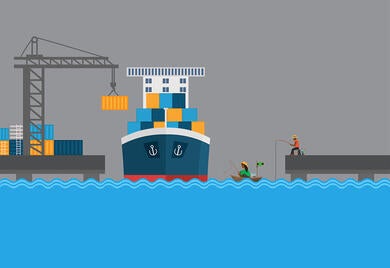Blogs Navigation
Sustainable BusinessRecent posts

Addressing gender-based violence from the private sector: the experience of Laboratorios Bagó
Francisco Méndez, CEO of the pharmaceutical company, shares his company's efforts and achievements in fostering an inclusive and safe work environment.

How Responsible Investments Can Empower Young Women and Girls in Miches While Boosting Tourism
In partnership with Fundación Tropicalia, IDB Invest fosters a more inclusive and sustainable growth path in the Dominican Republic by focusing on their untapped potential.

A Few Very Good Reasons to Protect the Integrity of Gender Bonds
Latin America and the Caribbean has become a leading region in gender bond issuance aimed at bolstering women’s empowerment. These instruments offer a promising capital market solution to mobilize funds towards projects that help accelerate parity.

Three keys for supporting Caribbean tourism after natural disasters
For the tourism sector, the second most important source of employment in the region, there will be a period of inactivity estimated to last between three to four months. This could reduce the sector’s revenue by as much as 50%, according to the World Travel and Tourism Council.

Unity is strength
The irruption of new players in the global commodities trade, greater consolidation of the multinationals, and the effects of climate change are forcing agricultural producers in Latin America and the Caribbean to rethink their strategies for minimizing risks and maximizing results on a sustainable basis. Realities and opportunities Although the research and development (R&D) investments of the “Big Four” (Bayer-Monsanto, ChemChina-Syngenta, Dow-Dupont, and BASF) achieved scientific advances that transformed global agriculture, expanded the agricultural frontier, and increased yields, producers face a dependence on technology and prices that is difficult to mitigate. Although in grains, companies like China’s COFCO or Japan’s Marubeni challenge the power of the ABCD (ADM, Bunge, Cargill, and Dreyfus), and demonstrate the strategic importance of ensuring the supply of commodities for some countries. In this fight, it is likely that corporate acquisitions will continue, or that new commodities platforms will be developed, creating opportunities for groups of producers, cooperatives, or business associations. Finally, the effects of climate change (rains, droughts, frosts, floods, cyclones, reduced aquifer flows, and new diseases) are affecting the producers’ profits, particularly in Central America where the narrow strip of land between two oceans makes climatic distortions even worse. Various ways to partner It is an historic reality that agricultural producers take the greatest risks but capture the smallest piece of the pie because of their fragmentation, difficulties in accessing financing, and minimum added value. However, producer partners in cooperatives that adapted to the dynamics of the market, through internal transformations (including advances in the management of corporate governance), were able not only to improve their incomes, but also to become part of a sustainable business, like Copersucar in Brazil, Conaprole in Uruguay, ACA in Argentina, FNC in Colombia, Colonias Unidas in Paraguay, or Dos Pinos in Costa Rica. In the case of independent larger-scale producers, although they will be able to maintain a certain individualistic profile internally to obtain efficiency and productivity, improving the external profitability is a must. They could take their inspiration from the spirit of cooperatives to create partnerships leveraging their combined volume (with increasing strategic value) and obtaining better conditions, or even process it for greater added value. For example, in Argentina, the 30 partnered producers of Bio4 transform their own and third-party corn to produce ethanol, and the “L” Group partners to sell milk. Similarly, in Mexico, the partnered producers of Proaoass and Gradesa export bread wheat or durum wheat. Although the greatest challenge for farmers under this model was to remain united, and in some cases to delegate the management of the new business to third-party professionals, they were also focused on obtaining better economic results, and also to develop a platform to start new businesses and obtain market intelligence. Looking ahead It is likely that differences in results among producers of a similar scale are due to: (1) more collective than individual actions; (2) a more business-like profile for sustainable production; and (3) the management of individuals or teams that applied the best technology packages. Considering that quasi-state companies, and sovereign funds from Asia-Pacific and Middle East countries are seeking alternatives to ensure the food supply, soon it would not be utopic to think that networks of partnered producers or cooperatives may develop strategic alliances to have their own ports, freezers, or powdered milk plants. Moreover, since these investments require long-term financing, it would not be unrealistic to think that development banking will be financing these projects. As Seneca said: “It is not because things are difficult that we do not dare, it is because we do not dare that things are difficult.” Subscribe to receive more content like this! [mc4wp_form]

Shared value takes off
The airport industry is key to the growth of air travel in Latin America. This industry generates 5.2 million jobs that add $167,000 million to the region’s gross domestic product annually. Projections indicate that during the next 20 years this industry will create 99 million jobs around the world. For example in Quito the Mariscal Sucre International Airport was built in 2013 as a private undertaking that, with the IDB Group support, would play a strategic role for this industry in the region. However, modern airports are much more than air transport terminals. They have become “development hubs where other air transport-related or complementary activities converge”, as we have already discussed. A ticket to local food It is increasingly evident that more airport operators and investors realize that environmental and social sustainability has become an investment opportunity that makes financial sense, generating significant benefits for sustainable development. Quiport S.A. — the private operator of the Quito airport — has not been an exception to the rule, and they approached us with a challenge in mind: how to share the value of this development with the local community? The first step was to support the company in conducting a shared value assessment, which allowed us to determine the current and potential resources available. Based on this analysis, Quiport decided to focus on three initiatives to improve both the company and community sustainability by establishing a community-based recycling organization, creating an aviation training center, and supporting the program development of Nuestra Huerta, helping local food producers to be involved in the airport activities. Over the last two years, IDB Invest has supported Nuestra Huerta with business, marketing, and execution trainings, including orientation regarding legal permits for food vending. Thus, the cooperative went from selling fruits and vegetables on a weekly basis to only 100 direct employees of Quiport, to selling more than 36 products to the 7,500 airport workers. Growth has been such that an online platform was created to place orders. Today, this program has benefited not only farmers, but also airport workers who can purchase fruits and vegetables in their workplace. Furthermore, Nuestra Huerta expects to open a store in the airport to sell their product to tourists. Shared value, multiplying effect on profits The Quiport project clearly shows that, in addition to any efforts and work aimed at including the community for the sake of sustainability, one of the most significant outcomes from this project are seen in the company´s positive bottom line. Even though it was not an initial project goal, the upcoming opening of a Nuestra Huerta store will generate a modest return for the airport. Currently, the company is developing recycling initiatives and an aviation training center. The recycling effort will allow the company to save in waste disposal costs, and generate some marginal income from the sale of recyclable materials. As for the training center, customer service will improve at the airport. IDB Invest is committed to working with the private sector to foster sustainable development in Latin America and the Caribbean. We seek investment opportunities that will bring about benefits to communities and companies, as we have done with the shared value assessment for the Quito project. It is not always easy to identify these opportunities, and it is even more challenging to move them forward, but Quiport is a good example that every effort has its reward. So, how do you share the value of your company? Subscribe to receive more content like this! [mc4wp_form]

4 ways to invest responsibly in hydropower
Hydropower presents many advantages as a source of energy, even though it is often complex from the environmental and social perspective. It is based on relatively simple and robust technology, easy to adapt to different conditions. Hydropower projects have a long-term life span, often benefiting several generations. Due to its long operational life and low operation and maintenance cost, hydropower generation continues to be highly competitive. Experiences around the world provide ample evidence that proactively addressing the potential impacts of projects early in the pre-feasibility phase is a sound investment decision by developers and contractors alike. The anticipation of potential risks and the identification of opportunities to benefit communities and ecosystems beyond the mitigation of impacts can significantly reduce implementation and operation and maintenance costs. A recent study by Harvard University on the cost of social conflicts in the extractive industry shows that companies usually do not understand and capture the full range of costs of conflicts with local communities. Costs arising from lost productivity due to temporary shutdowns or delays can escalate to millions of dollars. This is not different from what takes place with large infrastructure projects such as hydropower. Responsible development can benefit companies in at least four dimensions: 1. Social acceptance Projects that are developed considering the concerns and expectations of communities and that obtain a “social license to operate” are less prone to face social unrests, protests, or labor related challenges, such as strikes, invasions and vandalism to job sites and equipment. This, in turn, translates into lower costs and opportunities to build win-win alternatives in which both the private sector and communities benefit from the implementation of projects. 2. Reduction of administrative and legal processes Adequate treatment of social and environmental issues significantly reduces administrative and judicial processes that often hinder the implementation of projects and account for significant cost increases. Disputes over compensation, land expropriation, involuntary resettlement, or general mitigation of social impacts can drag on for years, generating direct costs as well as reputational impacts to companies and projects. 3. Financing alternatives Adequate identification of management of environmental and social risks can be directly linked to a wider range of alternatives, incentives, and better terms for financing projects. This can bring substantial upsides, like lower cost of capital to support the implementation of hydropower projects. 4. Reputational gains Positive image and corporate credibility resulting from responsible implementation of a project goes far beyond regional or sector specific benefits. Companies that are recognized as sustainability leaders are able to attract and retain talent, establish long term partnerships with privates, communities and NGOs, and expand involvement in different sectors, amongst others. The current scenario with increasing pressure for water, energy and food supplies, and the uncertainties associated with climate change, make the tangible benefits of hydropower greater than ever before. This represents challenges as well as opportunities for the development of sustainable hydropower projects. Accessing the full range of benefits that can be derived from hydropower requires responsible development of projects. At IDB Invest (formerly known as Inter-American Investment Corporation) we are supporting the implementation of hydropower projects such as Chaglla in Peru and Reventazon in Costa Rica that have been listed in a recent study as examples of best international practices. We will continue to partner with institutions and support projects that provide lessons and contribute to the sustainable development of countries in Latin America. [gallery type="slideshow" size="large" link="none" ids="8082,8083,8084,8085,8087,8088,8089,8090,8091,8092,8093,8095,8096,8098"] Subscribe to receive more content like this! [mc4wp_form]

Three best practices for energy companies investing in women
Three years ago, Marie-José Nadeau took the helm as the first woman to chair the World Energy Congress in its 90-year-history. She cautioned that the energy business was at a critical stage, suffering from underperformance and facing disruptive change. In her view, the industry would not have the ability to innovate and tackle these challenges without gender diversity. At the time, only 4% of executive board members at the top 100 utilities companies were women. Today, this number has inched up by only 1%, according to EY’s 2016 Women in Power and Utilities Index. At this rate, it would take the power industry four decades to reach 30% of women participation in boards. [clickToTweet tweet="At this rate, it would take the power industry 4 decades to reach 30% of women participation in boards" quote="At this rate, it would take the power industry four decades to reach 30% of women participation in boards" theme="style1"] At the employee level, a handful of energy companies in Latin America and the Caribbean are starting to invest in recruiting and training female personnel in non-traditional roles, for example, installing solar panels in remote areas and changing LED public lighting in cities. As renewable energy scales up across the region, technical jobs in solar and wind will be in high demand. Energy companies will have to widen their talent pool to meet this need. Here are three ways energy companies are already investing in opportunities that benefit men and women: 1. Investing in gender certifications Gender certifications today are what LEED certifications were a decade ago —a third-party seal of approval for sustainability— and some companies in Latin America are already investing in them. Based in Switzerland, global certifier EDGE (Economic Dividends for Gender Equality) is increasing its presence in Latin America and the Caribbean. Another option is seeking certification at the country level. These type of gender certifications allows companies to map and benchmark their efforts to create, support and advance gender equality throughout the workplace. In Mexico, this was the route that an energy service company took to start transforming its corporate culture. Based in Monterrey, Óptima Energía works with cities to replace incandescent street lights with energy-efficient LED street lamps. Two years ago, Óptima Energía embarked on a gender certification program through the Mexican Standards for Labor Equality and Non-Discrimination. Investing in a gender certification is just one of many steps this company is taking to ensure an equitable and inclusive workplace that attracts the best employees. 2. Partnering with technical universities to train new talent The solar industry is growing exponentially in Latin America and the Caribbean, and demand for experienced solar technicians is outstripping supply of qualified people. The same is true for the wind sector. With nearly two million people employed in renewable energy jobs, the need for a steady pipeline of qualified talent is opening doors for women. In the last five years, Uruguay has become a powerhouse wind producer, steadily moving away from relying on fossil fuels and hydropower. Solar is now ramping up. In 2015, the energy companies Technova and Sky Solar started installing solar panels in Paysandú, a small city in Western Uruguay on the Argentinian border. The companies wanted to hire locally, and partnered with Universidad del Trabajo (UTU) and Instituto Nacional de Empleos y Formación Profesional (INEFOP) to train local personnel in the assembly of solar photovoltaic projects. They set a target of 40% female participation in their programs and met their goal. 3. Recruiting women in STEM fields In Latin America, 45% of scientific researchers are women, surpassing even the global average; yet, women are vastly under-represented in science, technology, engineering and mathematics (STEM) fields. Cultural and socioeconomic barriers often lead young women to drop out of school to meet traditional obligations like care giving. In Panama, Grupo Ecos invested in an internship program targeting female students on STEM and finance tracks for the Divisa Solar project, the first utility-scale solar park in the country. Financed by IDB Invest (formerly known as Inter-American Investment Corporation) and the Canadian Climate Fund for the Private Sector in the Americas (C2F), Divisa Solar is changing the conversation around traditional gender roles while benefitting local women professionals. Empowering women makes business sense The evidence is clear —greater gender diversity drives business success. As the renewable energy boom in Latin America leaps ahead, investing in opportunities for women professionals will be critical for energy companies to stay ahead of the curve. Alison Kay, EY global vice-chair of industry, put it in these terms: “In these times of disruptive change, as the sector undergoes fundamental transformation, diverse leadership teams make good business sense.” Subscribe to receive more content like this! [mc4wp_form]

Making social investments count
When someone searches the word “sustainability” online, images of wind farms, trees, and waterways dominate the results. What is often missing from these photographs are people. It remains a challenge to break the habit of equating sustainability just with the environment. Sustainability, at its core, is something that should conjure not just these images but illustrations depicting people and the benefits of a positive healthy community. The private sector, in particular, should desire sustainable communities since this can often translate into better economic performance. According a study conducted by Deutsche Asset Management and the University of Hamburg, there is a positive correlation between good environmental, social and governmental practices and improved corporate financial performance. In other words, it literally pays to incorporate sustainability at the core of one’s primary business. An example of this is the Kingston Freeport Terminal Limited (KFTL) sustainable program at the Kingston harbor, in Jamaica. After winning the 30-year concession to operate the Kingston Container Terminal, KFTL saw an immediate need to seek out partners to become the catalysts for development in the harbor. Making room for sustainable infrastructure The first field visits to KFTL were challenging. I arrived at Greenwich, one of the largest fishing beaches in the harbor, to be immediately struck by the complexity of its location. Situated between the harbor and the state oil refinery on a slim piece of land, I wondered how these two could coexist. The visible conditions were extremely poor: no basic infrastructure and a landscape dotted with makeshift wooden shacks. Despite this, there was a real community there; fisherfolk (as they are called in Jamaica), who for several generations have made their livelihood from fishing these waters, have adapted to an extremely challenging environment. They are the largest —more than 4,000— and most economically vulnerable stakeholder. [clickToTweet tweet="Private sector should desire sustainable communities since they improve economic performance" quote="Private sector should desire sustainable communities since they improve economic performance" theme="style1"] As we began our conversations with the fisherfolk the tension was clear. The main concern was about the impact in their business, since previous experiences negatively affected their fish catch for more than a year. To define a social investment strategy and successfully structure the deal, IDB Invest (formerly known as Inter-American Investment Corporation) began working with KFTL. The purpose was to help the company to develop a long-term sustainability approach to ensure that investments produce benefits not only to private sector companies working with us but also to society. Coming to a sustainable agreement KFTL concession allows the company to modernize the harbor and to conduct dredging operations to receive larger Panamax vessels, which are designed to pass through the Panama Canal. These operations will increase employment opportunities for the surrounding communities, and help port operators engage with other stakeholders to ensure long-term sustainability for all harbor users. However, the creation of a long-term sustainability program was also a main objective for the company. This will be paramount to enhance relationships among port stakeholders, and invest in improving fisherfolk conditions. To increase social inclusion and incentivize an open dialogue, we recommended the creation of a committee with the fisherfolk fishing beach representatives, the Jamaican Port Authority, and KFTL staff. The committee has defined three main activities to revitalize the harbor: 1) provide livelihood support during dredging activities; 2) conduct solid waste cleanup of fish nurseries within the harbor; and 3) develop a fish sanctuary and artificial reef outside the harbor. These programs are still in their planning phases. However, their investments will provide long-lasting benefits to a community that has experienced declining incomes and economic vulnerability for years. On the business side, the 830 government workers from the port were employed by KFTL, and as container traffic increases additional labor growth is expected. Moreover, since the handover an additional 40 staff have been hired in various positions throughout the company. Ultimately, KFTL commitment will help shaping what it means to be a sustainable company while simultaneously providing a tangible improvement to an extremely vulnerable population. This is one clear example of how the private sector can leverage its resources to create economic benefits not only for itself, but also broad societal benefits for key stakeholders. Subscribe to receive more content like this! [mc4wp_form]


